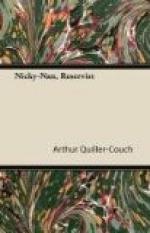Nicky-Nan, then, guessed well enough what had happened. Almost in a flash he had guessed it.
He had surprised the Old Doctor’s secret, hidden all these years. Folks used to make hoards of their money in the bygone days, when Napoleon threatened to invade us and deposit banks were scarce. And the Doctor, by all that tradition told, was never a man to break a habit once formed. For more than the span of two generations this wealth had lain concealed; and now he—he, Nicholas Nanjivell—was a rich man, if only he played his cards well!
With how sure an instinct he had clung to the old house!—had held on to this relic of a past gentility to which by rights he belonged!
He was a rich man now, and would defy Pamphlett and all his works—
How pleasant it is to
have money, heigho!
How pleasant it is to
have money!—
if only he knew how much!
And yet . . . Although philosophers in all ages have descanted on the blessings of Hope, and the part played by Imagination in making tolerable the business of living—so that men in the mass not only carry life through with courage but will turn and fight desperately for it, like stags at bay—it is to be doubted if one in ten ever guesses how constantly he is sustained by this spirit scorning the substance, gallantly blind, with promises lifting him over defeat. I dare to say that, save for the strength of hope it put into him, this wealth, so suddenly poured at Nicky-Nan’s feet, doubled his discomfort, physical and mental.
Of his physical discomfort, just now, there could be no question. He could not find courage to leave his trove and climb the stairs back to his bedroom. Some one might rob him while he slept, and— horror!—he would never even know of how much he had been robbed. The anguish in his leg forbade his standing sentry: the night wanted almost three hours of dawn. Shirt and trousers were his only garments.




